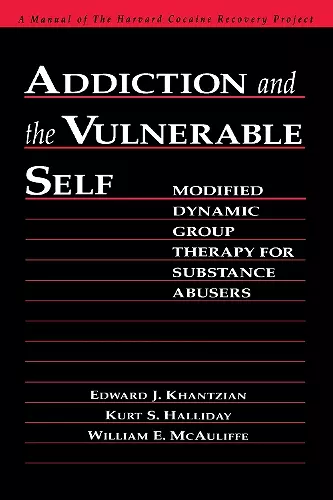Addiction and the Vulnerable Self
Modified Dynamic Group Therapy for Substance Abusers
Edward J Khantzian author Kurt S Halliday author William E McAuliffe author
Format:Hardback
Publisher:Guilford Publications
Published:25th Dec '90
Currently unavailable, our supplier has not provided us a restock date

The Harvard Cocaine Recovery Project, a National Institute on Drug Abuse-funded randomized clinical trial, was initiated in 1986 to compare different approaches for treating cocaine abusers. Modified Dynamic Group Therapy (MDGT), one of the models used in the study, is a short-term supportive-expressive psychodynamic group approach specifically adapted for cocaine addicts. While many previous studies of substance abuse treatment were compromised by extraordinarily high dropout rates, this approach retained nearly 70% of group members for the entire length of treatment. This book describes MDGT and provides a practical guide to implementation.
Based on an understanding of the psychological vulnerabilities of addicts, the MDGT model addresses the modifications in psychodynamic technique that are necessary for addicts' needs. It focuses on four main areas of difficulty involving self-regulation; affect, self-esteem, relationship, and self-care problems. Both supportive and expressive, the approach helps group members identify, process, and modify the characterological traits that mask addict's vulnerabilities. With this approach, a well-led group can heighten self-esteem, improve self-care, combat feelings of isolation and shame, and strengthen the individual's capacity for positive change. Concomitant involvement with an individual therapist/counselor is encouraged as a means to support and facilitate the group therapy, especially early in group treatment, and to maintain a flexible individual and group treatment context for self-exploration and understanding. Bringing the model to life are detailed vignettes and transcripts of groups in different phases of recovery. These cases demonstrate techniques, illustrate technical issues, and illuminate major themes that unfold during treatment.
'Useful information for anyone concerned with providing treatment to substance abusers....A valuable addition to this field.' - Contemporary Psychology
'At last, we have a thoughtful and scholarly text to assist us in using psychodynamic principles in helping our substance-abusing patients. This is must reading for all clinicians working with this population.' - J. Scott Rutan, PhD, retiring President, American Group Psychotherapy Assn., Assoc. Professor, (Psychology), Harvard Medical School, Department of Psychiatry
ISBN: 9780898621723
Dimensions: unknown
Weight: 504g
176 pages